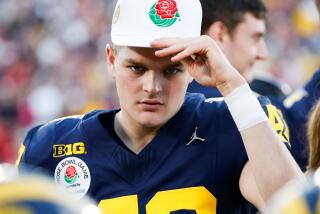There’s no quit in Carolina Panthers never-say-die assistant Richard Rodgers
- Share via
reporting from SAN FRANCISCO — A lot of people wrote off the Carolina Panthers last summer when star receiver Kelvin Benjamin was sidelined because of a knee injury.
Now, the Panthers are in Super Bowl 50 against the Denver Broncos after winning all but one regular-season game and carving their way through the playoffs with convincing victories over the Seattle Seahawks and Arizona Cardinals.
Richard Rodgers, a Panthers assistant coach, knows something about shocking the world after being written off. He and Panthers Coach Ron Rivera were teammates at Cal in the early 1980s and Rodgers was a central figure in “The Play,” the wildly improbable last-second kickoff return against Stanford in 1982 — a shocker that beat Stanford and quarterback John Elway, now the Broncos’ top football executive.
Rodgers, who goes by the nickname Rock, is defensive backs coach for the Panthers and was the team’s special-teams coordinator from the midway point of the 2012 season through the 2014 season.
So Rodgers is back in the Bay Area, part of a Super Bowl team facing Elway’s Broncos.
“It’s funny, it just seems like the longer you go in life, the smaller the world gets,” Elway said. “The way things work out is amazing.”
What’s more, Rodgers’ son, also named Richard, is a Green Bay Packers tight end who was on the receiving end of a Hail Mary pass that beat the Detroit Lions this season.
“I saw the ball go up in the air, and I don’t know if it’s parent’s intuition or what but I’m like, ‘He’s going to catch this,’” said the elder Rodgers, who was watching that game from his bedroom in Charlotte, nervously pacing because he was too fidgety to sit. “Sure enough, he went up there and got it.”
So lightning struck twice in the Rodgers family — first, one of the greatest plays in the history of college football and, 33 years later, maybe the most memorable play of the 2015 NFL season.

“It was unbelievable,” Rodgers said of his son’s touchdown pass from the unrelated Aaron Rodgers. “Those are the kind of moments you wish for your son to have. To reach the pinnacle in the NFL and make a play like that is certainly big for us in our family. It’s awesome.”
Think something is impossible? Don’t mention that to anyone in the Rodgers household.
Back in that ’82 game, it seemed as if Rodgers was the only player on the field who believed the Bears still had a chance. Stanford had taken a 20-19 lead with four seconds to play.
“I’m watching coaches put their heads down, throw their headsets on the ground,” recalled Gary Plummer, a teammate of Rodgers’ at Cal. “There weren’t enough guys on the field, and Richard Rodgers was just pulling guys off the sideline.”
As it happened, there were only 10 Cal players on the field for the return, which included five laterals — two by Rodgers. Midway through the return, the Stanford band took the field, thinking the game was over. Kevin Moen took an over-the-shoulder pitch, ran the final 25 yards into the end zone, and took out an unwitting trombone player at the end.
“I was sitting on the bench, and I saw the guys running by and I didn’t know what was going on,” Elway recalled. “Then it was just a melee. … I just remember there was hope for about 48 hours that they were going to come back and overturn the decision.”
Although some people argued the legalities of two of the laterals — one looked as if the Cal player might have been down, the other appeared close to an illegal forward pass — the touchdown was upheld.
Plummer, who later won a Super Bowl as a San Francisco 49ers linebacker, said if it weren’t for Rodgers and his steadfast belief that the Bears could pull off a miracle, Cal might have had five or six players on the field for the return.
“I used to tell people that was my first coaching job,” Rodgers said, “to be able to go into the huddle and convince those guys that it wasn’t over. Certainly in dealing with the young athletes that I’ve had to deal with through college and here in the NFL, to be able to present them with something that’s real like that and say, ‘I’ve been a part of, it ain’t over till it’s over.’ I’m not just saying that, I’ve lived it.”
Twitter: LATimesfarmer
More to Read
Go beyond the scoreboard
Get the latest on L.A.'s teams in the daily Sports Report newsletter.
You may occasionally receive promotional content from the Los Angeles Times.











